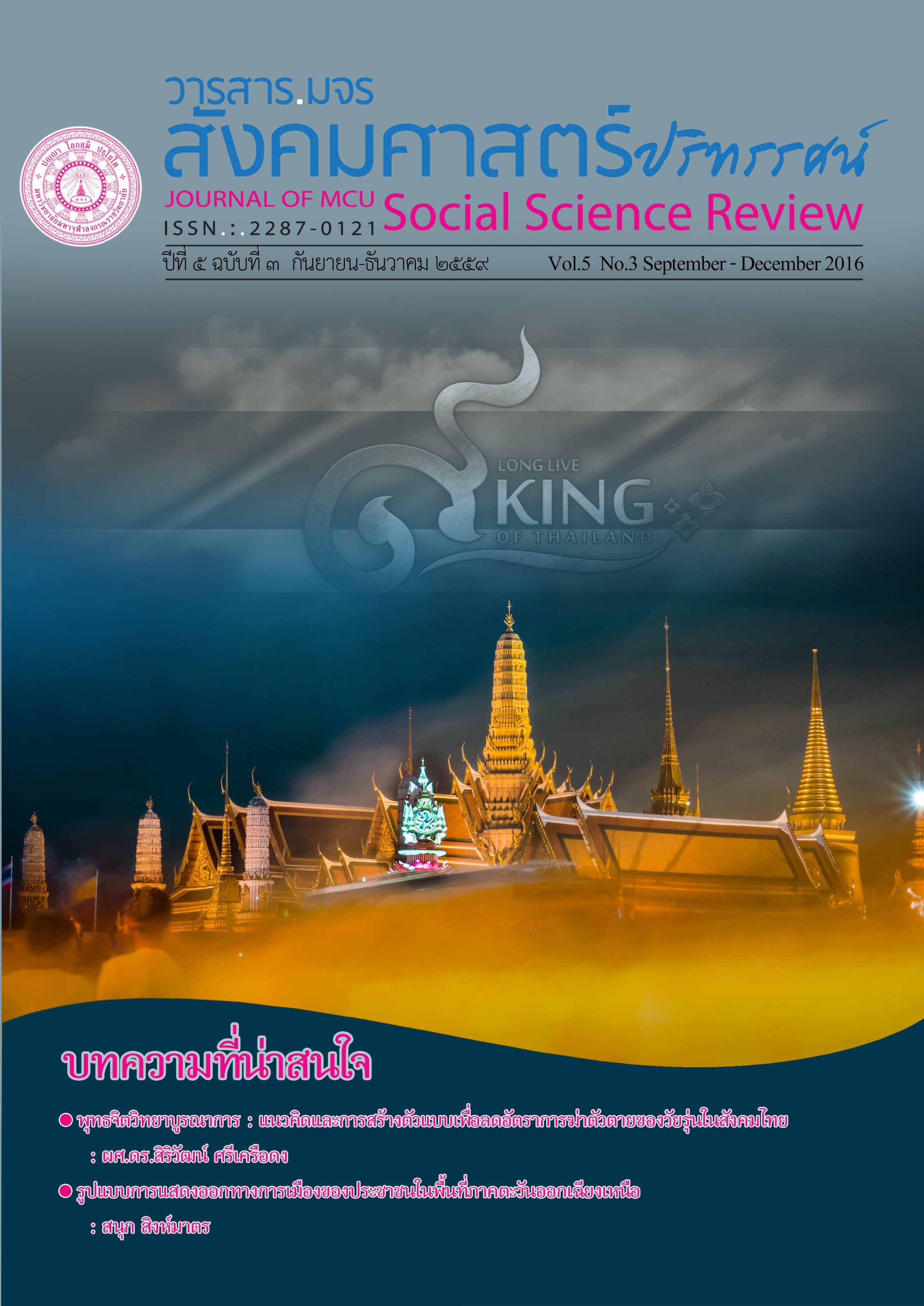รูปแบบการฝึกอบรมคุณธรรมจริยธรรมที่เหมาะสมสำหรับผู้ต้องขังหญิงตามพุทธวิธี
คำสำคัญ:
รูปแบบการฝึกอบรมคุณธรรม จริยธรรม, ตามพุทธวิธีบทคัดย่อ
บทความวิจัยนี้มีวัตถุประสค์เพื่อ ค) เพื่อศึกษาวิเคราะห์สภาพรูปแบบการฝึกอบรมคุณธรม จริยธรรมที่เหมาะสมสำหรับผู้ต้องขังหญิงตามพุทธวิธี ๒ เพื่อศึกษารูปแบบการฝึกอบรมคุณธรรม จริยธรมที่เหมาะสมสำหรับผู้ต้องขังหญิตามพุทธวิธี และ ๓) เพื่อเสนอรูปแบบการฝึกอบรมคุณธรม จริยธรมที่เหมาะสมสำหรับผู้ต้องขังหญิงตามพุทธวิธี ระเบียบวิธีวิจัยในครั้งนี้ใช้แบบผสานวิธี ระหว่างการวิจัยชิงคุณภาพและการวิจัยซิงปริมาณ การวิจัยเชิงคุณภาพ เก็บข้อมูลสองขั้นตอน ขั้นตอนที่หนึจกผู้ให้ข้อมูลหลักจำนวน 6๕ รูป/คน เลือกแบบเจาะจงจากผู้ทรงคุณวุฒิ เครื่องมือเก็บข้อมูลได้แก่แบบสัมภาษณ์เชิงลึกที่มีโครงสร้าง เก็บข้อมูลด้วยการสมภาษณ์แบบตัวต่อต้ และขั้นตอนที่สอง ก็บข้อมูลจากผู้มีส่วนร่วมในการสนทนากลุ่มเฉพาะจำนวน ด๐ รูป/ค วิเคราะห์ข้อมูลด้วยการพรณนาความ การวิจัยเชิงปริมาณ เก็บข้อมูลจากกลุ่มตัวอย่าง ๒๘๕ คน ที่เป็นผู้ต้องขังในเรือนจำ คื ผู้ต้องข้หญิงที่อยู่ในเรือนจำกลางราชบุรีด้วยแบบสอบถามวิเคระห์ข้อมูลด้วยสถิติพรรณนา ได้คำร้อยล คำเฉลี่ยและค่เบี่ยงเบนมาตรฐานผลการวิจัยพบว่า รูปแบบการฝึกอบรมคุณธรรม จริยธรรมที่เหมาะสมสำหรับผู้ต้องขังหญิงตามพุทธวิธี ประกอบด้วย กาฝึกอบรมที่ต้องคำนึงถึงองค์ประกอบ ๕ ด้าน คือ ๑) ด้านเนื้อหาสาระ ใช้พุทธวิธีมาประยกใช้ในชีวิตประจำวัน เนื้อหาต้องเข้ใจง่ย ตามเวลาที่เหมาะสม ๒) ด้านการจัดกิจกรมการพัฒนา จ้ตอบมด้านเศรษฐกิจพอเพียง การอบรมพัฒนาด้านอาชีพ จัดในลักษณะกิกรรมที่หลายวิธี พัฒนากิกรรมในด้นจิตใจ และปฏิบัติกรรมฐาน สวดมนต์ไหว้พระเพื่อให้เกิดปัญญา ๗) ด้านการใช้สื่อการกอบรม สื่อต่งๆ ให้ครบทั้งวิทยากร สื่อสิ่งพิมพ์ เอกสาร วีดีทัศน์ เพื่อให้ผู้รับการฝึกอบรมสนใจ เป็นไปตามลักษณและความจำเป็นเหมาะสม ๔) ด้านการประเมินผล เป็นข้อมูล และสารสนเทศต่งๆ พื่อนำไใช้ในการตัดสินใจเกี่ยวกับการวางแผนโครงการฝึกอบรมตรวจสอบความพร้อมของทรัพยกรต่งๆ ผลที่ได้จากการประเมินไปปรับปรุงกระบวนการ หรือขั้นตอนการฝึกอบรม เพื่อประโยชน์ในการกำหนดวิธีการฝีกอบรมที่เหมาะสมและถูกต้อง ๕) ด้านการใช้หลักรรม ด้นจิตใจ : การฝึกอบรมจิตให้เจริญงอกงามและมีความสุข และด้านปัญญา : ฝึกปัญญารู้เท่ทันโลกและชีวิตตามความเป็นจริง โดยกระบวนการอบรมบูรณาการเข้ากับสื่อสมัยใหม่ ความอดทน คือ ความอดกลั้น เป็นตบะอย่างยิ่ง ได้แก่ อดทนต่อ ความตรากตรำอดทนต่อทุกขวทนา อดทนต่อการกระทบกระทั่ง และอดทนต่ออำนาจกิเลส การทำจืตใจให้สะอาดคือ การฝึกพัฒนาจิตใจโดยวิธีการฝึกจิตแบบต่งๆ พื่อให้จิตมีความผ่องใสภายใน ได้แก่ การมีคุณภาพจิตที่ดี การใช้หลักพรหมวิหาร ๔ และใช้หลักคุณธรรม จริยธรรมในการฝึกอบรม เพราะเข้าใจง่ยและสามารถนำไปปฏิบัติได้จริง
เอกสารอ้างอิง
กรมราชทัณฑ์. แผนทิศทางกรมราชทัณฑ์ ฉบับที่ ๒ (พ.ศ.๒๕๔b-๒๕๕o). กรุงเทพมหานคร : กรม
ราชทัณฑ์, ๒๕๔๕.
รายงานการดำเนินงานต่อสาธารณชน ประจำปี ๒๕๕๐. กรุงเทพมหานคร : กรม
ราชทัณฑ์, ๒๕๕๐.
ธานินท ศิลป์จรุ. การวิจัยและวิเคราะห์ข้อมูลทางสถิติด้วย รPรร. พิมพ์ครั้งที่ ๑๐.
กรุงเทพมหานคร : บิสซิเนสอาร์แอนด์ดี, ๒๕๕๒.
พวงเพชร สุรัตนกวีกุล มนุษย์กับสังคม. กรุงเทพมหานคร : มหาวิทยาลัยเกษตรศาสตร์, ๒๕๔๒.
(๒) วารสาร:
สวัสดิ์ จิรัฏฐิติกล. "การฝึกวิชชีพและค่ตอบแทนการทำงานของผู้ต้องขัง". วารสาร มจร
สังคมศาสตร์ปริทรรศน์, ปีที่ ๔ ฉบับที่ ด มกราคม-มษายน ๒๕๕๘.
"การบริหารเรือนจำเชิพุทธบูรณาการ". วารสาร มจร สังคมศาสตร์ปริทรรศน์. ปื
ที่ ๓ ฉบับที่ ๒ พฤษภาคม-สิงหาคม ๒๕๕๗.
(๓) วิทยานิพนธ์/รายงานการวิจัย:
ชัยยุทธ ซิโนกุล. "กลยุทธ์การฝีกอบมและพัฒนพระภิกษุสมเณรในจังหวัดชายแดนภาคใต้ ".
วิทยานิพนธ์พุทธศาสตรดุษฎีบัณฑิต สาขาวิชารัฐประศสนศาสตร์. บัณฑิตวิทยาลัย :
มหาวิทยลัยมหาจุฬาลงกรณราชวิทยาลัย, ๒๕๔๖.
นฤนันท์ สุริยมณ และคณะ. คุณรรมจริยธรรมที่มีต่อการบริหารจัดการขององค์การบริหารส่วน
ตำบล. รายงานวิจัยฉบับสมบูรณ์. ศูนย์ส่งเสริมและพัฒนาพลังแผ่นดินเชิงคุณธรรม
สำนักงานบริหารและพัฒนาองค์ความรู้ (องค์การมหาชน), b๕๔๙).
นันทรัตน์ สายทอง และคณะ. "ความต้องการของผู้ต้องขังในการฝึกอบรมวิชาชีพหลักสูตรระยะสั้น
: ศึกษาเฉพาะ กรณีเรือนจำจังหวัดพระนครศรีอยุธยา". รายงานการวิจัย. มหาวิทยาลัย
เทคโนโลยีราชมงคลสุวรรณภูมิวิทยเขตพระนครศรีอยุธยา หันตรา, b๕๔๘.
ประป มากมิตร. "จริยธรมของผู้บริหารสถาบันอุดมศึกษา ". ปรัชญาตุษฎีบัณฑิต, (บัณฑิต
วิทยาลัย : มหาวิทยาลัยศิลปากร, ๒๕๕o.
พระราชปัญญาภรณ์ (สิงห์คำ ชยส) ป..๙. "กระบวนการสร้างสังคมคุณธรรมแบบมีส่วนร่วม
ภายใต้รูปแบบธนาคาความดี สำหรับหน่วยอบรมประชาชนประจำตำบล หนเหนือ".
วิทยานิพนธ์พุทธศสตรดุษฎีบัณฑิต. สาขาวิชาพระพุทธศาสนา. บัณฑิตวิทยาลัย :
มหาวิทยาลัยมหาจุฬาลงกรณราชวิทยาลัย, ๒๕๕๖.
อคครัตน์ พลกระจ่าง. “การพฒนาหลกสตรฝกอบรมหวหน้างานเพอพฒนาหลกสตรการสอนงาน
ปฏิบัติในสถานประกอบการ”. วิทยานิพนธ์ครุศาสตร์อุตสาหกรรมดุษฎบัณฑต. บัณฑิต
วิทยาลัย : สถาบันเทคโนโลยีพระจอมเกล้าพระนครเหนือ, ๒๕๕๐.
ดาวน์โหลด
เผยแพร่แล้ว
รูปแบบการอ้างอิง
ฉบับ
ประเภทบทความ
สัญญาอนุญาต
ลิขสิทธิ์ (c) 2016 วารสาร มจร สังคมศาสตร์ปริทรรศน์

อนุญาตภายใต้เงื่อนไข Creative Commons Attribution-NonCommercial-NoDerivatives 4.0 International License.
เพื่อให้เป็นไปตามกฎหมายลิขสิทธิ์ ผู้นิพนธ์ทุกท่านต้องลงลายมือชื่อในแบบฟอร์มใบมอบลิขสิทธิ์บทความให้แก่วารสารฯ พร้อมกับบทความต้นฉบับที่ได้แก้ไขครั้งสุดท้าย นอกจากนี้ ผู้นิพนธ์ทุกท่านต้องยืนยันว่าบทความต้นฉบับที่ส่งมาตีพิมพ์นั้น ได้ส่งมาตีพิมพ์เฉพาะในวารสาร มจร สังคมศาสตร์ปริทรรศน์ เพียงแห่งเดียวเท่านั้น หากมีการใช้ภาพหรือตารางหรือเนื้อหาอื่นๆ ของผู้นิพนธ์อื่นที่ปรากฏในสิ่งตีพิมพ์อื่นมาแล้ว ผู้นิพนธ์ต้องขออนุญาตเจ้าของลิขสิทธิ์ก่อน พร้อมทั้งแสดงหนังสือที่ได้รับการยินยอมต่อบรรณาธิการ ก่อนที่บทความจะได้รับการตีพิมพ์ หากไม่เป็นไปตามข้อกำหนดเบื้องต้น ทางวารสารจะถอดบทความของท่านออกโดยไม่มีข้อยกเว้นใดๆ ทั้งสิ้น





